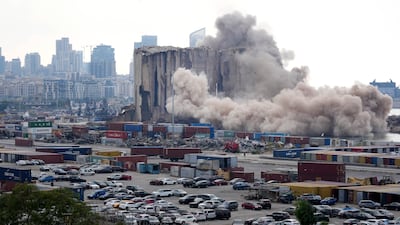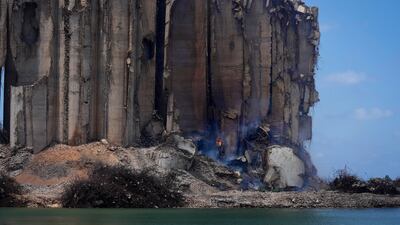A lawsuit filed in the US state of Texas on behalf of some of the victims of Beirut’s port explosion is expected to move quickly, with proceedings likely to begin in the “coming weeks”.
Accountability Now, a Swiss foundation dedicated to ending decades of impunity in Lebanon, filed a lawsuit this week on behalf of nine plaintiffs who are either American citizens or relatives of US victims affected by the blast.
At least 215 people were killed and more than 7,000 injured in the August 2020 explosion caused by ammonium nitrate that ignited at a Beirut port warehouse.
“We expect the proceedings to move quickly and the court to open hearings in the coming weeks,” Zena Wakim, a lawyer with Accountability Now, told The National.
“The court has already acknowledged the receipt of the claim.”
The legal action is focused on TGS, a US-Norwegian geophysical services group, for contracts it reportedly made with Lebanese authorities connected to the port and the plaintiffs are seeking $250 million in damages.
TGS is based in Texas and owns the British firm Spectrum Geo, which the lawsuit accuses of acquiring “highly profitable but suspicious contracts with the Ministry of Energy in Lebanon”.
In 2012, the lawsuit says, Spectrum chartered the Moldovan-flagged vessel Rhosus to carry 2,750 tonnes of ammonium nitrate to Beirut.
A TGS representative told The National that the company is aware of the lawsuit.
“A response to the lawsuit will be filed once we are formally served. We deny each and every allegation raised in the lawsuit, and intend to vigorously defend this matter in court,” the TGS representative said.
The company expressed confidence that Spectrum acted within the law and will prevail in the case.
“The allegations in the lawsuit attempt to draw a connection to a survey conducted in Lebanon in 2013 by a subcontractor on behalf of Spectrum,” the representative said and added that there were inquiries made about the survey after the blast.
“At that time, a comprehensive investigation was conducted, which confirmed that Spectrum acted diligently in its conduct of the survey and had no responsibility for the explosion,” the representative said.
“We are confident that we will prevail in this matter.”
Tania Daou-Allam, a plaintiff who lost her husband — a naturalised US citizen — in the blast, said she hoped the lawsuit would bring families closer to the truth.
We hope it will “unveil details we're not yet aware of and hopefully shed light on the story of why and how the ship was carrying ammonium nitrate in the first place,” she said.
On August 4, 2020, the heart of Beirut was ripped apart by the explosion, which was heard more than 100 kilometres away in Cyprus.
In the days following the tragedy, it was revealed that Lebanese government officials — including President Michel Aoun and then-prime minister Hassan Diab — knew that the explosive material was being stored unsafely in the port but failed to do anything about it.
An investigation by Human Rights Watch concluded that several Lebanese officials were, “at a minimum, criminally negligent”.
A Lebanese investigation launched in 2020 has so far been undermined by political pressure on the judiciary, preventing testimonies and threatening lead prosecutor Tarek Bitar.
Last December, former Lebanese ministers and MPs succeeded in stalling the investigation for a fourth time. Rights organisations have called officials' refusal to co-operate with the probe obstruction of justice.
To date, no parties have been held legally responsible for the blast.
But the Texas lawsuit is only the beginning, Ms Daou-Allam said.
“We follow up on the chain of causality until we find the responsible parties,” she said.
The Texas lawsuit seeks to force TGS to release the contracts detailing Spectrum’s involvement in the nitrate shipments.
“We want them to lift the secrecy around a contract that was entered into between Spectrum and the Ministry of Energy in 2012 and to disclose all Spectrum’s communication with third parties,” Ms Wakim said.
The foundation is confident in the evidence it has presented in the lawsuit and that protections under US law will force corporate transparency.
“The evidence we uncovered is sufficient … this is not a frivolous complaint,” Ms Wakim said.
If the case succeeds in forcing TGS to release the contracts, Accountability Now is planning to use this evidence to resume legal action inside Lebanon.
Ms Daou-Allam said part of her motivation for involvement in the lawsuit was to ensure that “every avenue is taken so I can take ensure justice is delivered”.
“[TGS] say they're just subcontractors and that they're not logistical experts. If we keep going around and around like that in the end no one will be held responsible for the blast.”
In June, three separate lawsuits were filed in Lebanon to stop the Lebanese government from demolishing the remains of the Beirut port’s grain silos, which took the brunt of the blast.
The half-destroyed silos are regarded by many in Lebanon as a monument to the victims of the explosion and as a symbol of the political corruption and negligence that led to it.
Ms Daou-Allam is also one of the plaintiffs in one of the suits filed in Lebanon.
“[My husband] has to be vindicated — they all have to be,” she said. “We owe them that.”

































